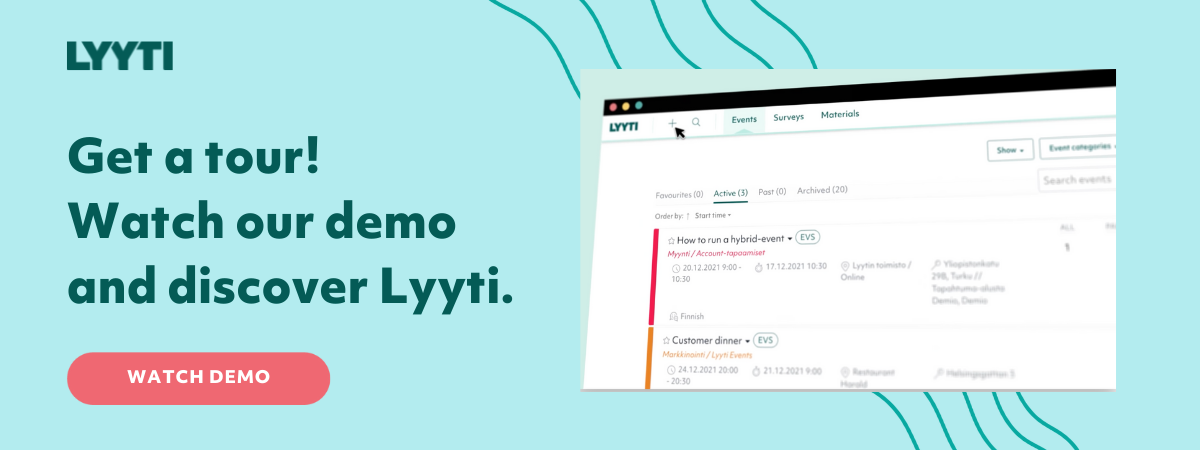The Internet is an essential way to get information, no matter who you are. Digital accessibility ensures everyone the possibility to search for information and use services, including people with various disabilities, such as visual, hearing or motor impairments. In this post, we share information on the main principles of accessibility and how we ensure accessibility in Lyyti.
Why is accessibility important?
The deadline for the EU Web Accessibility Directive is approaching fast. According to the Directive, each digital service provider must guarantee accessibility for their users and customers by 23 September 2020.
There are over one billion people globally (about 15%) who require accessibility in some way; it can, in fact, be considered a fundamental right. The purpose of accessibility is to ensure that everyone has an equal possibility to use and understand digital services (websites, applications and software), which also means that user experiences will be comprehensively improved for everyone – not just people with disabilities.
The Web Accessibility Directive and WCAG
The EU Web Accessibility Directive supports the objective that every European can be a part of the digital economy and community. Based on the Directive, the Finnish Act on the Provision of Digital Services entered into force on 1 April 2019, and the deadline for the gradual fulfilment of the accessibility requirements is 29 September 2020. The Directive is based on the Web Content Accessibility Guidelines (WCAG) whose purpose is to improve the accessibility of online services for people with disabilities. The guidelines are divided into three levels: A, AA and AAA, and the requirements under Finnish Government are mostly focused on levels A and AA. Level AAA is the most demanding one: a web service that fulfils the AAA level criteria must be accessible for an audience that is as diverse as possible, accommodating various degrees of restrictions and disability.
The four principles of WCAG
The WCAG is based on four principles stating that web content must be Perceivable, Operable, Understandable and Robust (POUR). Here is a short description of these principles.
The majority of people perceive online content visually, but if a person is visually impaired, perceiving certain kinds of content may pose challenges. Therefore, an online service provider should pay attention to aspects such as colours, contrast and text frames to make sure the content is easy to perceive even with impaired vision or no eyesight at all.
Operable refers to navigation; navigation should be possible in various ways to fulfil the operability criterion. For example, the majority of users navigate web sites using a keyboard and mouse, but if motor impairments prevent using either one or both, it should be possible to navigate the site with a sip-and-puff input device as well.
The user interface and the information it contains must be understandable for everyone. Even though there are certain rules of thumb and the principle itself may sound simple, its implementation is challenging for design and content production. Every human being is different and understands things differently. Nevertheless, UX designers are continually working on understandability as a concept, and we should be making content producers more aware of this issue as well.
The final principle is robustness. When user interfaces and operating systems are used with different web browsers, experiences and functions may vary considerably, which usually stems from the implementation of a website or a browser deviating from standards. In short, these aspects may cause bugs and accessibility issues, which is why online service providers should strive to follow common standards.
Accessibility in Lyyti
Lyyti’s accessibility has last been tested internally in Q3 of 2020, and we created an Accessibility Evaluation Report based on the test. You can read the report in its entirety at our Knowledge Base.
As of August 2020 Lyyti is in line with the EU Web Accessibility Directive and fulfils the WCAG 2.1 level A and AA requirements. If you have any questions related to accessibility in Lyyti, our customer service is happy to help.
Translated sources:
- https://wunder.io/fi/artikkelit/saavutettavuus-4-tarkeinta-perusperiaatetta-eli-pour/
- https://www.saavutettavasti.fi/verkkosisaltojen-saavutettavuus/wcag/
- https://ec.europa.eu/digital-single-market/en/web-accessibility









